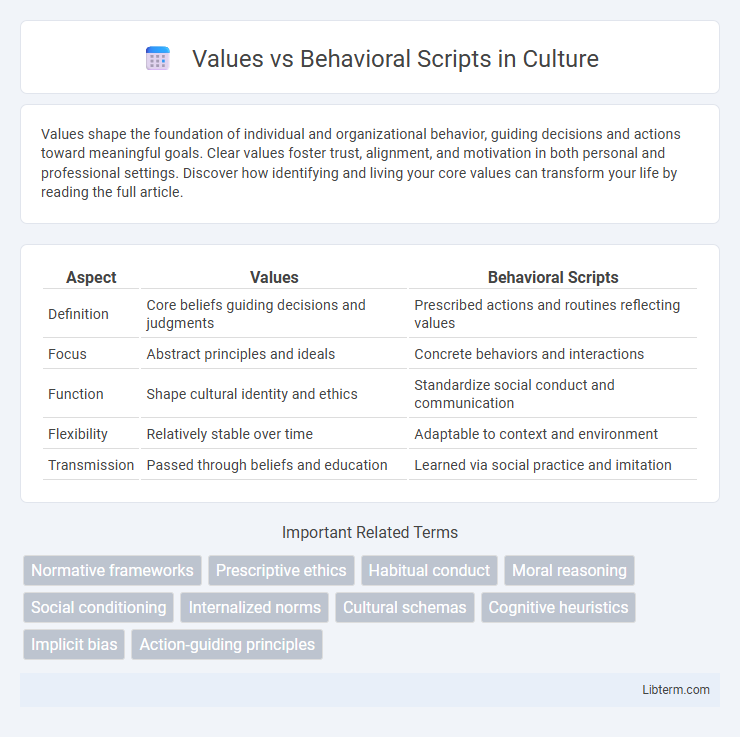Values shape the foundation of individual and organizational behavior, guiding decisions and actions toward meaningful goals. Clear values foster trust, alignment, and motivation in both personal and professional settings. Discover how identifying and living your core values can transform your life by reading the full article.
Table of Comparison
| Aspect | Values | Behavioral Scripts |
|---|---|---|
| Definition | Core beliefs guiding decisions and judgments | Prescribed actions and routines reflecting values |
| Focus | Abstract principles and ideals | Concrete behaviors and interactions |
| Function | Shape cultural identity and ethics | Standardize social conduct and communication |
| Flexibility | Relatively stable over time | Adaptable to context and environment |
| Transmission | Passed through beliefs and education | Learned via social practice and imitation |
Understanding Values: Core Principles Defined
Values represent core principles that guide decision-making and shape long-term goals, serving as fundamental beliefs about what is important in life. Behavioral scripts are learned patterns of action triggered by specific situations, reflecting how values are expressed through consistent behavior. Understanding values involves identifying these deep-rooted ideals that influence motivation, while behavioral scripts translate them into practical, context-specific responses.
What Are Behavioral Scripts? An Overview
Behavioral scripts are cognitive frameworks that guide individuals on expected actions and reactions in specific social situations, streamlining decision-making and social interactions. These mental patterns help predict outcomes based on learned experiences, enabling smoother coordination and communication within various contexts. Understanding behavioral scripts is essential for analyzing how automatic responses influence behavior compared to more abstract values.
Differentiating Values from Behavioral Scripts
Values represent core principles that guide decision-making and shape long-term priorities, while behavioral scripts are specific patterns of actions learned through experience and social context. Differentiating values from behavioral scripts involves recognizing that values are abstract, stable concepts such as honesty or respect, whereas behavioral scripts are concrete sequences of behaviors performed in particular situations. Understanding this distinction helps in modifying behavior effectively by targeting underlying values rather than just observable actions.
The Role of Values in Guiding Decisions
Values serve as fundamental guiding principles that shape individuals' decision-making processes by prioritizing what is deemed important and desirable. Behavioral scripts represent learned sequences of actions triggered by specific contexts, but values influence the selection and adaptation of these scripts to align with personal or cultural goals. The integration of core values ensures that decisions remain consistent with long-term objectives rather than merely habitual responses.
How Behavioral Scripts Shape Daily Actions
Behavioral scripts act as cognitive frameworks that guide individuals in habitual tasks and social interactions, allowing efficient decision-making and reducing the need for constant deliberation. These scripts, often developed through repeated experiences, shape daily actions by providing predictable patterns that influence responses to common situations. As a result, behavioral scripts directly impact routines, habits, and social behaviors, reinforcing consistent performance aligned with underlying psychological schemas.
Values vs Behavioral Scripts in Social Contexts
Values in social contexts serve as guiding principles that influence individuals' perceptions and judgments, while behavioral scripts are specific, learned patterns of action triggered by social cues. Values shape long-term goals and moral reasoning, whereas behavioral scripts enable quick, automatic responses in social interactions based on cultural norms. The interplay between values and behavioral scripts affects how people navigate social roles, maintain relationships, and conform to group expectations.
The Impact of Culture on Values and Scripts
Cultural context profoundly shapes values, which serve as core principles guiding individuals' judgments and priorities. These values influence behavioral scripts, the culturally learned patterns of conduct that dictate appropriate responses in social situations. Variations in cultural norms lead to distinct scripts, affecting communication styles, interpersonal interactions, and decision-making processes across societies.
When Values and Behavioral Scripts Conflict
When values and behavioral scripts conflict, individuals experience cognitive dissonance, leading to stress and decision-making challenges. Values represent deeply held beliefs guiding long-term goals, while behavioral scripts are learned routines adapted to social contexts. Resolving these conflicts often requires reassessing priorities or modifying behaviors to restore psychological alignment and maintain social harmony.
Developing Self-Awareness: Aligning Values and Behaviors
Aligning values with behavioral scripts enhances self-awareness by clarifying the connection between personal beliefs and everyday actions. Developing this alignment requires intentional reflection on core values and consistently observing behavior patterns that either support or contradict these principles. Strengthening this synergy fosters authentic decision-making and promotes personal growth through conscious behavioral adjustments.
Fostering Personal Growth Through Values and Scripts
Values provide a foundational framework that guides decision-making and shapes personal identity, while behavioral scripts offer practical patterns for enacting those values in real-life situations. Aligning behavior with core values fosters self-awareness and intentional growth, enabling individuals to develop resilience and adaptability in diverse contexts. Emphasizing consistency between values and scripts accelerates personal development by reinforcing meaningful habits and promoting authentic actions.
Values Infographic

 libterm.com
libterm.com